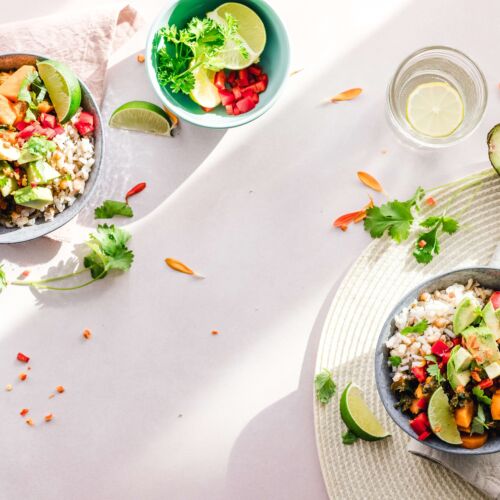5 Tips to Cope with Your Feelings Without Using Food
by Dawid Furman

Coping with your feelings without using food is the seventh principle of Intuitive Eating outlined by Tribole & Resch in the Intuitive Eating Workbook.
Considering the celebratory nature of food, it is often connected with emotions, and people often use it as a way to comfort themselves during stressful moments.
Eating to numb emotional pain can often lead to emotional overeating.
It is important to try to resolve your issues without using food.
Although emotional eating may numb pain in the short term, in the long run, it will only cause more problems and make you feel worse.
It is important to uncover the source of your emotional pain and find other methods of dealing with it.
Want to know how to handle your emotions without turning to food? The best place to start is to is detect your vulnerability to eating.
It is important to ask yourself if your overeating is actually caused by emotions or by other factors such as lack of self-care or a result of the diet mentality.
If your self-care is not up to scratch, it may be hard to hear the inner hunger and fullness cues, so it is important to work on key components of self-care like meditation, movement, and relaxation.
Make sure you are getting enough sleep, reflect on your life balance, and make amends if any aspects of your life are out of balance. Make sure you are eating consistently and adequately so you won’t enter a state of primal hunger, and lastly, try to take time to manage stress before it becomes overwhelming.
It is also important to make peace with food and reject the diet mentality, with more tips on how to do that found in other articles in this series.
If you identify that a lack of self-care or diet mentality may be contributing to overeating, it may be better to work on those areas before trying to deal with your emotional eating.
However, if you are ready to battle emotional eating, follow on reading for 5 tips cope with your feelings without using food.
1. Identify Reasons for Emotional Eating
Food has had an emotional association with people pretty much from the day we are born, where milk offers the baby comfort and support (as well as survival) in a pleasurable situation.
It is important to acknowledge how emotional eating has impacted you. If you acknowledge the fact that you were only trying to help yourself by under or overeating, you may feel self-compassion and it might make it easier to give up the behaviour.
Explore the recent times you under or overate for reasons irrelevant to hunger and next explore the pros of this behaviour, e.g. the comfort it gave you. Then list the negative effects this has had on you, such as the isolation you felt.
Next, ask yourself, “Do the pros outway the cons?”
As overeating is often caused by emotional triggers such as anxiety or emptiness, list any emotions that spark emotional eating for you and describe how you reacted to these triggers.
2. Be Aware of Your Range of Feelings
Many people try to hide or avoid their feelings, so it is important to explore them honestly to find out if they cause you to overeat.
Think of the following emotions: fear, anger, sadness, joy, disgust, surprise, and shame.
Next, think of the last time you felt any of those emotions and how they made your body feel.
The next time you feel any of the following emotions, note how it made you feel, where in your body did you feel it, and was it pleasant or not, etc.
Getting familiar with your feelings is a vital part of fighting emotional eating.
3. Heal Emotional Eating through Self Care, Nurturance, And Compassion
Establishing these points are key steps in the process of coping with your emotions without using food, as they not only show you that you have emotional needs but also that they are important, and you have the right to meet them.
There are many needs, such as getting enough sleep and rest as well as sensual pleasure, that is essential for self-care. Not meeting them can make you frustrated.
In order to really cope with your emotions, you should try self-nurturance which goes beyond self-care and involves going the extra mile to be nice to yourself. Examples of self-nurturance involve things like asking for a hug or getting a massage.
List the nurturing activities that you do and those you would like to do in the future, and ask yourself if there is a time in the day you could add these activities.
Lastly, in order for this to be effective, it is important to practice self-compassion and understand that you may sometimes revert to old behaviours you don’t want to, however, this is okay and is a normal step in the process.
4. Learn to Sit with Your Feelings
Many people have trouble finding out how they feel when not hungry but want to eat, or when they have eaten enough to satisfy hunger but want to eat more, it is important to take some time out to ask themselves how they are really feeling.
Taking time out to figure out your emotional triggers will leave you able to focus more on your hunger and satisfaction when eating rather than feelings.
If, after taking 5 minutes to explore your feelings you still want to eat despite not being hungry, ask yourself in a non-judgmental manner, “Is there something I am missing that I may need?”
Next, ask yourself how can you fulfill this need without using food? For example, you may need to spend time with friends if feeling lonely.
Remember, ask yourself regularly what you are feeling and what you really need. Doing this on a regular basis will build up your emotional muscles so that you will be able to control your feelings in a way your need to eat will disappear.
5. Find A Helpful Distraction
Although you have been taught about sitting with your feelings and nurturing your mind, sometimes this is just unrealistic, and you may have to find yourself a helpful distraction.
Sometimes a non-destructive joyful activity is just needed to take your mind off what you are feeling.
There are many distractions that can take your mind off your feelings such as watching a movie, listening to music, or solving a crossword.
Choose an activity that you specifically enjoy in which you can truly immerse yourself to not be with your feelings.
To be prepared for future situations, think of possible stressful situations and strategies you could use to solve them.
If you found this blog post interesting, please continue reading our 10 Intuituve Eating principles series on Intuitive Eating. Intuitive Eating is challenging, but with the help of a Registered Dietitian, it is common that clients will break through and get off their diet rollercoaster for the long haul and open up space in their life to feel more freedom.
If you are interested to learn more about Intuitive Eating, continue reading:
- Ditch The Diet Mentality
- Honor Your Hunger
- Make Peace With Food
- Challenge The Food Police
- Feel Your Fullness
- Discover The Satisfaction Factor
- Cope with Your Feelings Without Using Food
- Respect Your Body
- Exercise: Feel the Difference
- Honour Your Health: Feel the Difference
Find Your Registered Dietitian here:
On Dietitian Directory you can find all sorts of Dietitians including Intuitive Eating Dietitians, Weight Inclusive Dietitians, Mindful Eating Dietitians and Emotional Eating Dietitians
About the Author: Dawid Furman is a nutrition and exercise science student studying at the South East Technological University in Ireland and hopes to pursue a career as a dietitian in the future.
Reviewed by: Lindsey McGregor, RD
Images from: Unsplash and Pexels
The Site is not intended to be a substitute for professional advice. Under no circumstances will we be liable for any loss or damage caused by your reliance on information obtained through the Site. You are responsible for evaluating the accuracy, completeness, or usefulness of any information, opinion, advice, or other content available through the Site. Please seek the advice of professionals, as appropriate, regarding the evaluation of any specific information, opinion, advice, or other content. Never disregard professional advice, including medical advice, or delay in seeking it because of something you have read on this Site.



